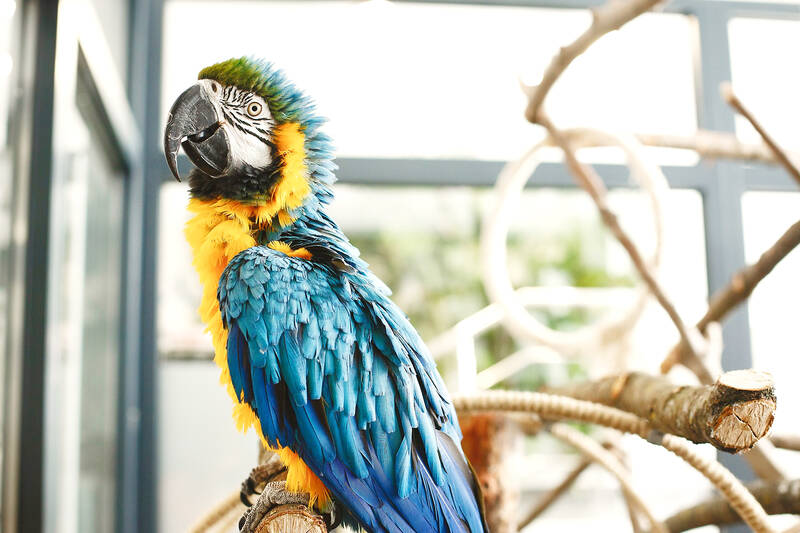With their colorful feathers and charming ability to imitate human speech, parrots have captured the hearts of numerous pet owners across the world. However, many owners aren’t aware that parrots are incredibly social animals that need plenty of attention and company. In the wild, they thrive in large flocks, but captivity often deprives them of the opportunity to interact with other birds.
Bored and lonely parrots are at risk of developing psychological issues or harmful habits such as plucking out their own feathers. Thankfully, a new study has shed light on how modern technology can help relieve the loneliness of pet parrots.
In a bid to provide parrots with the interaction they lack, researchers from several universities collaborated on a unique project. They recruited 18 parrots from an online training program for pet parrots called Parrot Kindergarten. The parrots were taught to ring a bell, which alerted their owners that they wanted to use a tablet. They would then proceed to tap an image of another parrot on the screen. This initiated a video call, bringing another parrot “face-to-face.” After becoming familiar with this procedure , the birds were allowed to call their friends freely. In this phase of the experiment, the parrots made 147 deliberate video calls, each one keenly observed by the owners to ensure the birds’ well-being.

Photo courtesy of Wikimedia 照片:維基共享資源提供
The findings of the study were encouraging. The parrots appeared to enjoy their virtual hang-outs. They displayed a range of different behaviors, including singing, playing around and showing off their toys. Many parrots even chose to call the same birds over and over again, suggesting that long-lasting bonds were being formed. While video chats can’t recreate how parrots socialize in the wild, they can offer a beneficial addition to the lives of pet parrots and brighten up their days.
憑藉其色彩繽紛的羽毛和使人著迷的模仿人類言語的能力, 鸚鵡擄獲了全球許多寵物飼主的芳心。然而,許多飼主沒有意識到鸚鵡是非常喜歡交際的動物,需要充足的關懷與陪伴。在野外,牠們在大群體中茁壯成長,但被圈養往往使牠們失去與其他鳥兒互動的機會。感到無聊和孤獨的鸚鵡有可能出現心理問題或有害的習慣,例如啄掉自己的羽毛。幸運的是,一項新研究闡明了現代科技如何幫助緩解寵物鸚鵡的孤獨感。
為了提供鸚鵡所缺乏的互動,來自多所大學的研究人員合作進行了一項獨特的專案。他們從名為「鸚鵡幼兒園」的寵物鸚鵡線上培訓課程中招募了18隻鸚鵡。這些鸚鵡被教導搖響鈴鐺,這用以提醒飼主們牠們想要使用平板電腦。鸚鵡會接著點擊螢幕上另一隻鸚鵡的圖像。
這將開啟視訊通話,使另一隻鸚鵡「面對面」地出現在螢幕上。在熟悉這個程序後,鸚鵡被允許自由地和牠們的朋友打電話。在實驗的這個階段,這些鸚鵡進行了147次有意的視訊通話,每一次都由飼主仔細觀察以確保這些鳥兒的健康。
這項研究的結果令人鼓舞。這些鸚鵡似乎喜歡牠們的虛擬聚會。牠們表現出各種不同的行為,包括唱歌、嬉戲以及炫耀牠們的玩具。許多鸚鵡甚至選擇一遍又一遍地打給同一隻鸚鵡,這意味著牠們之間正在形成持久的友誼。雖然視訊通話無法再現鸚鵡在野外的社交方式,但它可以為寵物鸚鵡的生活增添益處,讓牠們的日子更加美好。
MORE INFORMATION
captivity n. 囚禁;束縛
pluck v. 拔掉;摘取
well-being n. 健康;幸福
KEY VOCABULARY
1. numerous adj. 許多的;大量的
The famous actor has won numerous awards in the course of his long and successful career.
這位有名的演員在他長久且成功的職業生涯中贏得了許多的獎項。
2. interaction n. 互動;交流 interact vi. 互動;交流
The two leaders have had several interactions, but they haven’t signed a deal yet.
這兩位領導人有過幾次互動,但是他們還未簽訂任何協議。
3. recruit v. 招募;徵兵
Judy recruited volunteers from her class to help run the charity bake sale.
茱蒂從她班上招募志願者來協助舉辦烘焙義賣會。
4. alert v. 提醒;警告
When my dog wants to go outside, it alerts me by scratching the door.
當我的狗想去外面時,牠會抓門來提醒我。
5. initiate vt. 發起;開始
Rick initiated a conversation with the pretty girl because he wanted to ask her on a date.
瑞克與那位漂亮女孩開始談話,因為他想要和她約會。
6. procedure n. 程序;手術
Please follow the proper procedure when submitting your application.
提交申請時請遵循正確的程序。
7. virtual adj. 虛擬的
The professor posted a virtual lesson plan on the school’s Web site.
那名教授在學校網站上發布了虛擬課程的計畫。
8. bond n. 聯繫;關係
The boys developed a close bond during high school and remained friends for the rest of their lives.
這些男孩在高中時培養出密切的情誼,並且成為終生的朋友。
9. brighten up 使……生色;使……活躍起來
The sweet note from my friend really brightened up my day.
那張朋友給我的窩心小紙條讓我一整天都很高興。
學習音檔: https://magazine.english4u.net/Magdata/menu/ey0ui
《空中美語》雜誌APP免費下載: https://www.english4u.net/apps/index.aspx
免費收聽當月《空中美語》雜誌課文朗讀及解析 !
文章由AMC空中美語授權使用: https://www.english4u.net

In most cities, food waste is often regarded as one of the most troublesome types of waste: it has a high moisture content, spoils easily and produces strong odors. If not handled properly, it can cause serious sanitation and environmental problems. From the perspective of the circular economy, however, food waste is not “useless leftovers,” but rather an organic resource that has yet to be effectively utilized. The core principle of the circular economy is to break away from the linear model of “production–consumption–disposal,” allowing resources to circulate repeatedly within a system and extending their useful life. Food waste occupies a

In June, headlines shocked the art world when a visitor damaged a 17th-century painting at the Uffizi Galleries in Florence, Italy, while posing for a photograph. This was not an isolated event. Recently, similar disasters have been reported worldwide, from a child damaging a Mark Rothko painting to a tourist breaking an exhibit by pretending to sit on it. Such incidents highlight why museum etiquette is increasingly crucial. First, we must recognize that art and historical objects are fragile. Once damaged, they may never regain their original condition. Many common actions, though harmless at first glance, can have grave consequences. For

A: Google has unveiled its 2025 Year in Search chart. No. 10 to No. 6 are: Typhoon Podul, Chinese drama “Love’s Ambition,” tariffs, US President Donald Trump and singer Khalil Fong’s death. B: Wow, actress Rosy Zhao’s new drama is so popular. So what are the top five? A: No. 5 to No. 1 are: Gemini, hanzii.net, NT$10,000 cash handout, entertainer Big S’ death and earthquakes. B: Hasn’t Trump topped this year’s most-searched people chart? A: Yup, and he’s closely followed by cheerleader GuoGuo Chiang at No. 2, whose husband Zack Fanchiang is also at No. 8. Apparently, people are curious about her extramarital

Continued from yesterday(延續自昨日) The study also uncovered a correlation between breathing patterns and mental well-being. Participants with higher scores on anxiety questionnaires exhibited shorter inhalation periods and more frequent breath pauses during sleep. “We intuitively assume that how depressed or anxious you are changes the way you breathe,” says one researcher involved in the study. “But it might be the other way around.” If this proves true, then training people to adjust their breathing may offer a novel approach to managing conditions like anxiety or depression. 該項研究也揭露了呼吸模式與心理健康之間的關聯。在焦慮問卷得分較高的受試者於睡眠期間表現出的吸氣時間較為短促、呼吸中止更為頻繁。一位參與研究的學者表示:「我們直覺地認為憂鬱或焦慮的程度會改變你的呼吸方式,但有可能是反過來的情況。」如果這一假設得到證實,那麼訓練人們調整呼吸的方式,可能會成為管理焦慮或憂鬱等疾病的新穎方法。 What Did You Learn? 1. What problem did scientists previously face when trying to measure breathing patterns? 2.